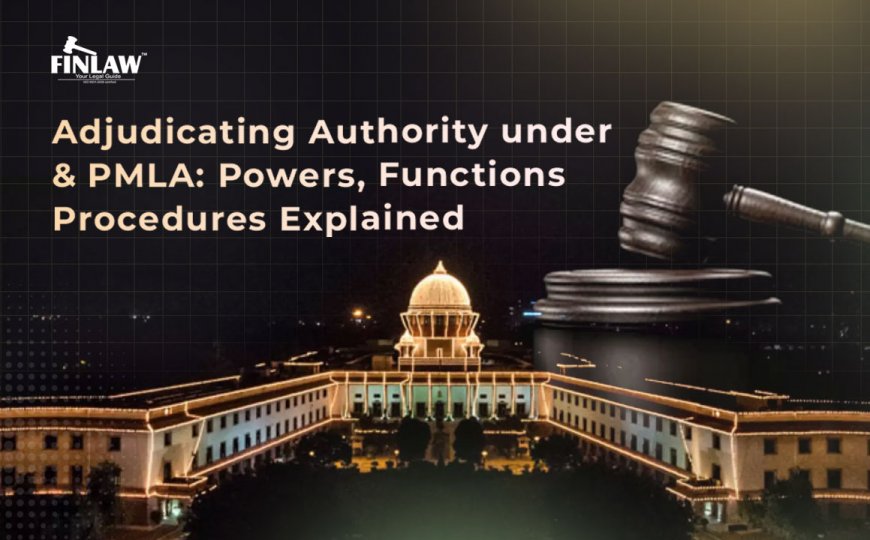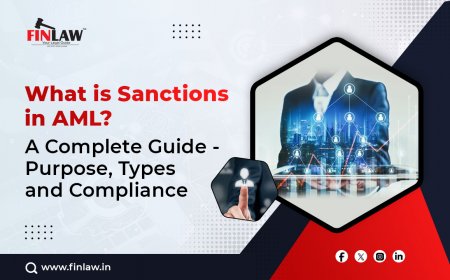Adjudicating Authority under PMLA: Powers, Functions & Procedures Explained
Learn about the Adjudicating Authority under PMLA—its powers, functions, and procedures in handling money laundering cases in India.

The Prevention of Money Laundering Act, 2002 (PMLA) is a cornerstone in India's legal framework to combat financial crimes. A pivotal component of this act is the Adjudicating Authority, which plays a crucial role in determining the legitimacy of property attachments made under the act. This article delves into the composition, powers, functions, and procedures of the Adjudicating Authority under PMLA, providing a comprehensive understanding for stakeholders and the general public.
What is the Adjudicating Authority under PMLA?
Established under Section 6 of the PMLA, the Adjudicating Authority is a quasi-judicial body appointed by the Central Government. Its primary function is to determine whether any property attached or seized is involved in money laundering activities. The authority ensures that the process of attachment is not misused and that individuals have a fair opportunity to present their case.
Composition of the Adjudicating Authority
As per Section 6 of the PMLA, the Adjudicating Authority comprises:
-
Chairperson
-
Two other Members
The qualifications for these members are:
-
At least one member must have experience in the field of law, qualified to be a District Judge or has been a member of the Indian Legal Service in Grade I.
-
The other member should have experience in finance, administration, or accountancy.
The Chairperson and members are appointed by the Central Government, ensuring a blend of legal and financial expertise within the authority.
Jurisdiction and Benches
The Adjudicating Authority exercises its jurisdiction through benches constituted by the Chairperson. These benches can consist of one or two members, depending on the complexity of the case. While the principal seat is in New Delhi, benches can be established in other locations as notified by the Central Government in consultation with the Chairperson.
Powers and Functions
The Adjudicating Authority's primary responsibilities include:
-
Confirmation of Provisional Attachments: When the Enforcement Directorate (ED) provisionally attaches property suspected to be involved in money laundering, the Adjudicating Authority reviews and confirms or rejects the attachment within 180 days.
-
Issuance of Show Cause Notices: Before confirming an attachment, the authority issues notices to affected parties, allowing them to present evidence and arguments.
-
Conducting Hearings: The authority conducts hearings where both the ED and the affected parties can present their cases.
-
Passing Orders: Based on the evidence and hearings, the authority decides whether the property is involved in money laundering and passes appropriate orders.
-
Regulating Procedures: The authority has the power to regulate its own procedures, guided by principles of natural justice and not strictly bound by the Code of Civil Procedure.
Procedural Workflow
The typical procedure followed by the Adjudicating Authority includes:
-
Receipt of Complaint: The ED files a complaint regarding the provisional attachment of property.
-
Issuance of Notice: The authority issues a notice to the person whose property has been attached, seeking an explanation.
-
Filing of Reply: The noticee submits a reply, providing evidence and arguments against the attachment.
-
Hearing: Both parties are heard, and evidence is examined.
-
Order: The authority passes an order confirming or releasing the attachment.
Legal Safeguards and Appeals
To ensure fairness and transparency:
-
Right to Appeal: Aggrieved parties can appeal against the Adjudicating Authority's order to the Appellate Tribunal within 45 days.
-
Further Appeals: Decisions of the Appellate Tribunal can be challenged in the High Court.
-
Principles of Natural Justice: The authority is guided by these principles, ensuring that parties have a fair opportunity to present their case.
Challenges and Criticisms
While the Adjudicating Authority plays a vital role, it has faced criticisms:
-
Delays in Proceedings: There have been instances of delays in confirming or releasing attachments, leading to prolonged uncertainty for affected parties.
-
Allegations of Bias: Some stakeholders have raised concerns about potential biases, emphasizing the need for greater transparency and accountability.
-
Complex Procedures: The procedures can be intricate, requiring affected parties to seek legal assistance, which may not be accessible to all.
Conclusion
The Adjudicating Authority under the PMLA serves as a crucial mechanism to ensure that actions taken against money laundering are justified and lawful. By providing a platform for review and appeal, it balances the state's interest in combating financial crimes with the individual's right to property and fair treatment. Continuous efforts to enhance its efficiency, transparency, and accessibility will further strengthen India's fight against money laundering.
What's Your Reaction?



















